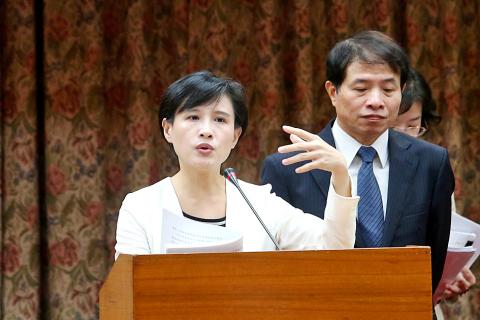Chinese Internet media service operator iQiyi (愛奇藝) cannot establish a local subsidiary under laws regulating cross-strait affairs, Minister of Culture Cheng Li-chiun (鄭麗君) said yesterday in response to questions from lawmakers during a briefing at the Legislative Yuan.
Cheng was at a meeting of the legislature’s Education and Culture Committee to explain how the government is planning to develop the Internet media industry, which delivers audio, video or other media without an operator controlling the distribution of content, which is referred to as over-the-top (OTT) content.
Some committee members raised the issue of iQiyi , which has submitted its third application for a local subsidiary.

Photo: CNA
Chinese Nationalist Party (KMT) Legislator Ko Chih-en (柯志恩) said that 25 percent of the programs on iQiyi are Taiwanese dramas, and the platform could help these programs reach millions of viewers in China, which could encourage Taiwanese producers to produce more TV dramas.
IQiyi has already attracted local users, and allowing it to establish a subsidiary would allow the government to tax it for the revenue it has earned here, Ko said.
A local office could also be held accountable if disputes arose over the firm’s service, she said.
Cheng said that the Regulations Governing Permission for People from the Mainland Area to Invest in Taiwan (大陸地區之營利事業在台設立分公司或辦事處許可辦法) state that OTT services belong to the service category in which Chinese investment is not allowed.
“The iQiyi’s case is currently under review by the Investment Commission, which has sought the opinion of the Ministry of Culture,” Cheng said. “Our response would be that we have to protect our right to broadcast our own cultural content. China has yet to allow Taiwanese OTT operators to offer services in China. All these factors need to be taken in consideration as the commission reviews the case.”
She said the government wants to develop OTT services as they are a great opportunity to transform the broadcasting and television industry.
“In addition to the subsidies and prizes that are already available for people working in the broadcasting and film industries, we hope to expand the investment from the National Development Fund in these two industries,” she said.
Democratic Progressive Party (DPP) Legislator Su Chiao-hui (蘇巧慧) said that the ministry should review dramas and movies produced by OTT providers for the Golden Bell Awards or the Golden Horse Award nominations.
The US drama series House of Cards, one of the most popular series on Netflix, an OTT provider, has received Golden Globe Awards, Primetime Emmy Awards and other recognition, she said.
National Communications Commission (NCC) spokesperson Wong Po-tsung (翁柏宗) said that the commission is not planning to draft specific laws to regulate OTT service providers, as the majority of nations worldwide are light-handed when it comes to regulating Internet content.
One has to abide by the current regulations if the case involves Chinese investment, Wong said.
However, the NCC is considering relaxing broadcasting regulations so that television channels and OTT service are regulated along the same lines, he said.

Intelligence agents have recorded 510,000 instances of “controversial information” being spread online by the Chinese Communist Party (CCP) so far this year, the National Security Bureau (NSB) said in a report yesterday, as it warned of artificial intelligence (AI) being employed to generate destabilizing misinformation. The bureau submitted a written report to the Legislative Yuan in preparation for National Security Bureau Director-General Tsai Ming-yen’s (蔡明彥) appearance before the Foreign Affairs and National Defense Committee today. The CCP has been using cognitive warfare to divide Taiwanese society by commenting on controversial issues such as Taiwan Semiconductor Manufacturing Co’s (TSMC, 台積電) investments in the

HELPING HAND: The steering committee of the National Stabilization Fund is expected to hold a meeting to discuss how and when to utilize the fund to help buffer the sell-off The TAIEX plunged 2,065.87 points, or 9.7 percent, to close at 19,232.35 yesterday, the highest single-day percentage loss on record, as investors braced for US President Donald Trump’s tariffs after an extended holiday weekend. Amid the pessimistic atmosphere, 945 listed companies led by large-cap stocks — including Taiwan Semiconductor Manufacturing Co (TSMC, 台積電), Hon Hai Precision Industry Co (鴻海精密) and Largan Precision Co (大立光) — fell by the daily maximum of 10 percent at the close, Taiwan Stock Exchange data showed. The number of listed companies ending limit-down set a new record, the exchange said. The TAIEX plunged by daily maxiumu in just

INVESTIGATION: The case is the latest instance of a DPP figure being implicated in an espionage network accused of allegedly leaking information to Chinese intelligence Democratic Progressive Party (DPP) member Ho Jen-chieh (何仁傑) was detained and held incommunicado yesterday on suspicion of spying for China during his tenure as assistant to then-minister of foreign affairs Joseph Wu (吳釗燮). The Taipei District Prosecutors’ Office said Ho was implicated during its investigation into alleged spying activities by former Presidential Office consultant Wu Shang-yu (吳尚雨). Prosecutors said there is reason to believe Ho breached the National Security Act (國家安全法) by leaking classified Ministry of Foreign Affairs information to Chinese intelligence. Following interrogation, prosecutors petitioned the Taipei District Court to detain Ho, citing concerns over potential collusion or tampering of evidence. The

‘COMPREHENSIVE PLAN’: Lin Chia-lung said that the government was ready to talk about a variety of issues, including investment in and purchases from the US The National Stabilization Fund (NSF) yesterday announced that it would step in to staunch stock market losses for the ninth time in the nation’s history. An NSF board meeting, originally scheduled for Monday next week, was moved to yesterday after stocks plummeted in the wake of US President Donald Trump’s announcement of 32 percent tariffs on Taiwan on Wednesday last week. Board members voted to support the stock market with the NT$500 billion (US$15.15 billion) fund, with injections of funds to begin as soon as today. The NSF in 2000 injected NT$120 billion to stabilize stocks, the most ever. The lowest amount it